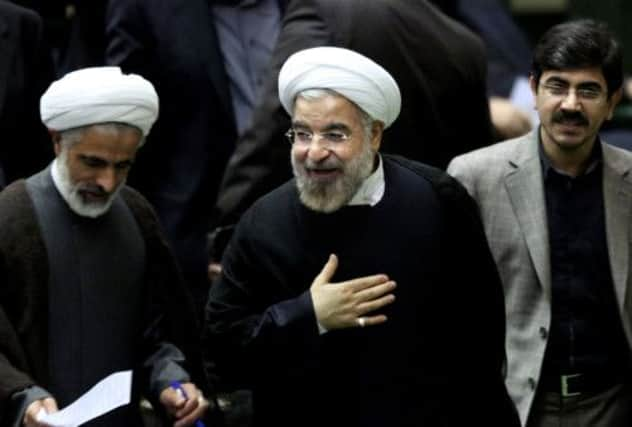Iran: Rouhani says he’s no pushover for West


Mr Rouhani was speaking to the Iranian parliament, a bastion of wary conservatives, a day after the Islamic Republic and the six powers narrowed differences at talks in Geneva and decided to resume them on 20 November to try to defuse a decade-old stand-off.
The sides seemed on the verge of a breakthrough – before France declined to endorse the proposal under discussion, believing it did not adequately neutralise the risk of an Iranian atomic bomb.
Advertisement
Hide AdAdvertisement
Hide AdFrench foreign minister Laurent Fabius told France Inter radio that Paris desired a nuclear settlement with Iran but could not accept a “fool’s game” – in other words, one-sided concessions to Tehran.
Diplomats said France wanted any deal to require a shutdown of Iran’s Arak heavy-water reactor, of potential use in making bomb-grade plutonium, and the removal of Iran’s stockpile of higher-enriched uranium. Another sticking point was the extent and sequencing of relief from sanctions demanded by Tehran.
Israel condemned the interim deal taking shape in Geneva as it would leave some of Iran’s nuclear fuel-making capacity intact rather than dismantle it, while giving Tehran respite from sanctions. Prime minister Benjamin Netanyahu served notice that Israel would not feel bound by such a deal, unmistakably reiterating a veiled threat to take military action if it deems diplomacy to restrain Iran’s nuclear ambitions a dead end.
Mr Rouhani told the Iranian parliament, “we will not answer to any threat, sanction, humiliation or discrimination.
“The Islamic Republic has not and will not bow its head to threats from any authority.
“For us there are red lines that cannot be crossed. National interests are our red lines that include our rights under the framework of international regulations and [uranium] enrichment in Iran.”
Mr Netanyahu said yesterday it was good that no deal with Iran was clinched at the weekend and that he had lobbied against scaling back sanctions by telling leaders: “What’s the rush?”
US secretary of state John Kerry, said: “We are not blind, and I don’t think we’re stupid. I think we have a pretty strong sense of how to measure whether or not we are acting in the interests of our country and of the globe.”
Advertisement
Hide AdAdvertisement
Hide AdThe fact that any deal might be feasible after a decade of increasingly heated confrontation between Iran and Western powers, shows the striking shift in the tone of Iranian foreign policy since Mr Rouhani’s landslide election victory in June.
A relative moderate, he opened diplomatic windows to a nuclear deal in order to alleviate sanctions that have throttled Opec giant Iran’s lifeblood oil industry and cut it off from the international banking system.
He has won crucial public backing from Supreme Leader Ayatollah Ali Khamenei, Iran’s ultimate authority, who – despite his profound suspicion of Washington – has warned hardline loyalists not to discredit the negotiating path.
Mr Rouhani has repeated Iran’s insistence on a right to sovereign nuclear energy for peaceful purposes as a member of the Non-Proliferation Treaty.
Most diplomats concede that, since Tehran has expanded its nuclear capacity exponentially since 2006 and publicly equated the programme with national pride and progress, the time for demanding its total shutdown – although enshrined in several UN security council resolutions – has now passed.